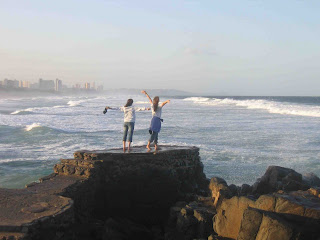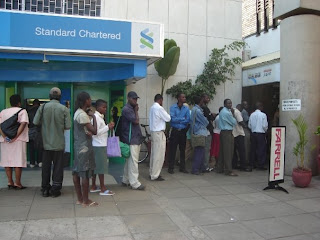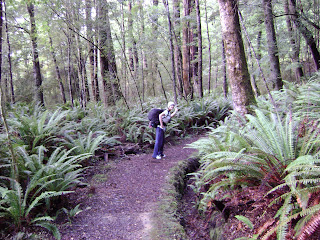Ah, here it is again, that inevitable first question: How was Haiti?
Although your question contained only three simple words, a just answer does not reside in a sentence. Or one paragraph. Or even a single page. Haiti is more than just: Earthquake, Cholera, Camps. So how interested are you, really? Because we could talk about this over a beer, or a coffee, or ice cream, or a fire, but I can’t give you an easy answer. I can’t make it quick. I will not even try. There is no justice in treating a complex experience as a simplistic entity.
I wanted to be shocked by Port-au-Prince--by how much progress has occurred since the earthquake, and by how much good the NGOs are doing there. Instead, I found myself rapidly adjusting to the endless piles of rubble, UN Armed Guards, blue and gray tent camps, and buildings untouched and still uneven since January 12, 2010. And that was just the first 30 minutes in the country...
For me, Haiti was personal and profound and I’m scared to write about it because I can’t quite make sense of it myself. I am still off-kilter, in the most beautiful way possible, from my time there. I don’t want to write about the earthquake, or conditions in the camps, or cholera or what Sean Penn is doing there. Without a doubt, those things shaped my experience but they were not my experience there.
My experiences are to unfold in the stories to come...
Needless to say, Haiti was not what I expected. Butit was what I needed. HAITI, my experience:
Although your question contained only three simple words, a just answer does not reside in a sentence. Or one paragraph. Or even a single page. Haiti is more than just: Earthquake, Cholera, Camps. So how interested are you, really? Because we could talk about this over a beer, or a coffee, or ice cream, or a fire, but I can’t give you an easy answer. I can’t make it quick. I will not even try. There is no justice in treating a complex experience as a simplistic entity.
I wanted to be shocked by Port-au-Prince--by how much progress has occurred since the earthquake, and by how much good the NGOs are doing there. Instead, I found myself rapidly adjusting to the endless piles of rubble, UN Armed Guards, blue and gray tent camps, and buildings untouched and still uneven since January 12, 2010. And that was just the first 30 minutes in the country...
For me, Haiti was personal and profound and I’m scared to write about it because I can’t quite make sense of it myself. I am still off-kilter, in the most beautiful way possible, from my time there. I don’t want to write about the earthquake, or conditions in the camps, or cholera or what Sean Penn is doing there. Without a doubt, those things shaped my experience but they were not my experience there.
My experiences are to unfold in the stories to come...
Needless to say, Haiti was not what I expected. But
----------------------------------------------------------------------------------------------------------------
Team Gangstas, Wangstas, Gangsters and Real Gs!
You are almost finished with me dithering on about Haiti....
I could write about meeting a hougan* at a Bourgeois party. I could tell you that of all the beautiful men and women there, I felt energetically, not physically attracted to, but energetically drawn to sit beside a middle-aged, Buddha-bellied mulatto man for a reason I could feel but could not explain. “You are a Gemini and your birthday is coming up soon,” were his first words to me. I could tell you about how I tried to look unimpressed and not in the least bit shocked as he explained that he “dabbled in astrology.” I could tell you about how this stranger then proceeded to tell me things about myself that no stranger could know. And how he told me things about my future that are equally disturbing. I could tell you about how that started at four in the afternoon and then suddenly, it was midnight, and I looked up only to notice how everyone else was embracing and kissing cheeks with heartfelt goodbyes. I could tell you that it was only on the drive home that I learned he was a Voodoo Priest.
I could also tell you about waiting line at the airport for my return flight back to the US, where I meet a petite 75 year old American nun who moved to Haiti fifteen years ago and only returns to the US for two weeks out of the year to visit her family. I could tell you about how you could see in her eyes and in her smile her love for Haiti because when she spoke of this country, her being lit up. I could also tell you how, as I was leaving to move further back inside the plane to my seat, she winked at me and announced “I have a feeling I will see you again in the streets of Port-au-Prince.”
I could tell you about my experiences on the streets of Port-au-Prince--not stories of kidnappings, robberies, muggings and deceit but help and kindness from poor and upper-class Haitians alike. I could tell you about how people made sure I made it in the right tap-tap, the only blan wedged in the back of a mid-90s pick-up truck with 19 other people, trying to fight the slight sense of claustrophobic panic and complete lack of control while our driver expertly fought his way through the madness that is PaP traffic. I could tell you how people offered me rides, took me to lunch, helped me find the best grilled chicken and juiciest coconuts from street vendors, helped me fix my broken sandals and walked with me from one place to the next so I would not get lost, expecting nothing in return.
I could tell you about ashen gray and dusty blue-- the colors of the tents. 700,000 people still live in tents within Port-au-Prince. I could tell you about brown- the color of the landscape immediately surrounding Port-au-Prince, the soil depleted from years of abuse. I could tell you about crimson!- the color of sunrises and sunsets that dared me to feel alive every evening and every morning.
And those stories would all be true.
But I would rather tell you about school and soccer, both of which should be a universal right for kids everywhere--in Hickory and in Haiti . Perhaps through this lens we can begin to understand the connections between NYC and PaP, voodoo and vaccines, water and well-being (the UN and Cholera), prosperity and poverty. Understanding these links demands looking beyond Earthquake, Cholera, Camps.
It is a complicated intimacy that may require waiting, being patient and a few Lucky Strikes.
:)
All the best my friends,
amy
--------------------------------------------------------------------------------
The Article:
Vail Valley Voices: What I saw in Haiti
Amy Herron
Vail, CO, Colorado
Vail, CO, Colorado
I recently went to Haiti to see Haiti. I wanted to discover if Haiti is as bad and as dangerous as the American news machine would have us believe.
So in spite of the language barrier (I don't speak French or Creole), the protests of friends and family or the fact that I did not know anyone inHaiti, I bought a plane ticket.
I naively thought I would find a way to help. Indeed, almost every Haitian I met, would ask, with identical sarcastic tone and slight role of the eyes: “Are you here to help Haiti?” What was going on here? What did it mean that “help” was viewed as laughable, maybe even ludicrous?
Perhaps the answer lies amid the 10,000 or so non-government organizations working in Haiti. It is as if Haiti is being occupied by NGOs and even though this occupation falls under the umbrella of “doing good,” it still comes with all the humiliations and benefits an occupation brings to a poor, uneducated, indebted people whose strength is sapped by a history of internecine struggles.
Repeatedly NGO workers declared, “Darling, you don't understand.”
But I might. I understand that if you give away food in a tent community, you cripple the local economy by inhibiting vendors from selling their local food.
I understand that a tent school is not a long-term solution, only a short-term logistical problem. After all, if you don't provide the school supplies or the salary for a teacher, you did not actually create a school.
I understand that putting in a water purification system in a rural village that requires purchasing a new filter from a an American company every six months does not just improve the health in a community, it also creates a long-term dependency both financially and morally. And there is nothing clean about that.
I understand that homes damaged from the earthquake should not have to be demolished by hand.
I understand this is dangerous, heart wrenching work -- to return to your own home to dismantle the memories and the concrete without the use of cranes, bulldozers and jackhammers. Yet that is precisely the task people are beginning to undertake throughout Port-au-Prince, and there is no NGO providing the tools, technology or knowledge to do it any other way. The fact that these things are every day occurrences should not be understandable.
All NGOs are not created equal. There are worthwhile organizations doing beautiful, inspiring work in Haiti. I witnessed one: L'Athletique D'Haiti. On the outskirts of Cite de Soleil, Haiti's most notorious slum, a miracle is occurring. kKds are given a safe haven to be kids. It is here, on the only open soccer field left in all of Port-au-Prince, that 2,000 kids come daily to play soccer.
Since L'Athletique D'Haiti's inception 16 years ago, this non-profit has grown into an organization that provides sports training, nutrition, medical and educational assistance to underprivileged youth living throughout Port-au-Prince.
This is what an NGO is supposed to be about: providing opportunity, harnessing hope, teaching life lessons, encouraging education while providing discipline, love, and nourishment for the body and the mind.
Here I saw Universal Children Rights in action -- poor and wealthy kids, side by side participating in the joy of soccer, discovering the truths of teamwork and hard work.
It is amazing how things have returned to normal in Port-au-Prince, but in this case normal is not good. It is a structural failure, a human failure. For things to return to normal, it is a return to the broken.
I reject the notion that the average Haitian's response to immense tragedies are any different than how you or I would act if thrust into those situations. They are simply doing what they must to survive. I do not write that to belittle the Haitian spirit but to overcome the essence of separation within that statement.
The connotation that “we” are somehow different, that Haitians are not “us” but instead a “they.” I reject this.
The resilience to continue living through poverty, earthquake, cholera, camps, political oppression and social distress is not a testament to the Haitian spirit but to the human spirit. We are all connected.
Amy Herron is a Vail resident.
So in spite of the language barrier (I don't speak French or Creole), the protests of friends and family or the fact that I did not know anyone inHaiti, I bought a plane ticket.
I naively thought I would find a way to help. Indeed, almost every Haitian I met, would ask, with identical sarcastic tone and slight role of the eyes: “Are you here to help Haiti?” What was going on here? What did it mean that “help” was viewed as laughable, maybe even ludicrous?
Perhaps the answer lies amid the 10,000 or so non-government organizations working in Haiti. It is as if Haiti is being occupied by NGOs and even though this occupation falls under the umbrella of “doing good,” it still comes with all the humiliations and benefits an occupation brings to a poor, uneducated, indebted people whose strength is sapped by a history of internecine struggles.
Repeatedly NGO workers declared, “Darling, you don't understand.”
But I might. I understand that if you give away food in a tent community, you cripple the local economy by inhibiting vendors from selling their local food.
I understand that a tent school is not a long-term solution, only a short-term logistical problem. After all, if you don't provide the school supplies or the salary for a teacher, you did not actually create a school.
I understand that putting in a water purification system in a rural village that requires purchasing a new filter from a an American company every six months does not just improve the health in a community, it also creates a long-term dependency both financially and morally. And there is nothing clean about that.
I understand that homes damaged from the earthquake should not have to be demolished by hand.
I understand this is dangerous, heart wrenching work -- to return to your own home to dismantle the memories and the concrete without the use of cranes, bulldozers and jackhammers. Yet that is precisely the task people are beginning to undertake throughout Port-au-Prince, and there is no NGO providing the tools, technology or knowledge to do it any other way. The fact that these things are every day occurrences should not be understandable.
All NGOs are not created equal. There are worthwhile organizations doing beautiful, inspiring work in Haiti. I witnessed one: L'Athletique D'Haiti. On the outskirts of Cite de Soleil, Haiti's most notorious slum, a miracle is occurring. kKds are given a safe haven to be kids. It is here, on the only open soccer field left in all of Port-au-Prince, that 2,000 kids come daily to play soccer.
Since L'Athletique D'Haiti's inception 16 years ago, this non-profit has grown into an organization that provides sports training, nutrition, medical and educational assistance to underprivileged youth living throughout Port-au-Prince.
This is what an NGO is supposed to be about: providing opportunity, harnessing hope, teaching life lessons, encouraging education while providing discipline, love, and nourishment for the body and the mind.
Here I saw Universal Children Rights in action -- poor and wealthy kids, side by side participating in the joy of soccer, discovering the truths of teamwork and hard work.
It is amazing how things have returned to normal in Port-au-Prince, but in this case normal is not good. It is a structural failure, a human failure. For things to return to normal, it is a return to the broken.
I reject the notion that the average Haitian's response to immense tragedies are any different than how you or I would act if thrust into those situations. They are simply doing what they must to survive. I do not write that to belittle the Haitian spirit but to overcome the essence of separation within that statement.
The connotation that “we” are somehow different, that Haitians are not “us” but instead a “they.” I reject this.
The resilience to continue living through poverty, earthquake, cholera, camps, political oppression and social distress is not a testament to the Haitian spirit but to the human spirit. We are all connected.
Amy Herron is a Vail resident.
--------------------------------------------------------------------------------------------
Oh Goodness, Team,
This is just a tangent to a longer writing I am working on...
Haiti, Politically Correct
aka
Why I Am Stuck, And Do Not Know What To Say
There are approximately 10,000 Foreign NGOs currently working on Haitian soil. It is as if Haiti is under an occupation. Although it is an NGO occupation, it still comes with all the humiliations and benefits an occupation brings to a poor, indebted, proud people whose strength is sapped by internecine struggles and exterior forces of Nature.
***How do I say, politically correctly, that for the most part, NGOs are not doing anything productive? If anything, they might be making Port-au-Prince worse. They are often doing work and providing services that are government responsibilities. What is more, NGO actions, at least in part, cripple the government’s’ ability to be a government and provide basic government services. How do I say that without being viewed as a bad person?***
Well, I have said it. I have thrown it out there. I choose to seek Truth. Maybe that makes me a bad person. But it also makes me an honest person.
Where do I go from here? Wait and see....
A dopo,
amy
----------------------------------------------------------------------------------------
“Wait.” The UN worker answered, while lighting a cigarette. Smiling, she said it again, “Wait.” She took her first long drag of nicotine and exhaled, “Patience.” She took a deep inhale, exhaling another smokey, “Patience.” Tapping the ash off the end, she grinned, nodding towards her cigarette, “Smoke. Smoke.” Francine,* with slender fingers and neatly trimmed nails, had been working for the UN in Port-au-Prince since the earthquake. I had been in Haiti for less than 24 hours, so of course I was seeking her advice on All-Things-Haiti. But could that really be it? Could the key to navigating Haiti simply be: “Wait, wait; Patience, patience; Smoke, smoke”? At the time, I was disappointed that Haiti could be summed up in six words. Especially those six words. Hell, the “smoke, smoke” could not even apply to me--cigarette smoke makes me queasy.
How could I have known that her words would turn out to prove endlessly useful during my time in Haiti?
I selfishly went to Haiti to see Haiti. I wanted to see and experience Haiti for myself. I wanted to discover if Haiti is as bad and as dangerous as the American News Machine would have us believe. So, in spite of the language barrier (I don’t speak French or Creole), the worries and protests of my caring friends and family, or the fact that I did not know anyone in Haiti, I bought a plane ticket. I naively thought I would find a reason NOT to use my return flight. In fact, I was seeking a reason to stay, a way to “help”. Instead, I found myself confronted with a question by almost every Haitian I met, and each time the question was posed with the same sarcastic tone and slight chuckle: “Are you here to help Haiti?” they would ask and I could feel their eyes roll, even if I didn’t see them. What was going on here? What did it mean that “help” was viewed as laughable, maybe even ludicrous?
Perhaps the answer lies amidst the 10,000 or so NGOs (Non-Government Organizations) currently working in Haiti. It is as if Haiti is being occupied by NGOs and even though this occupation falls under the umbrella of “doing good” it still comes with all the humiliations and benefits an occupation brings to a poor, uneducated, indebted people, their strength sapped by a history of internecine struggles. After all, the goal of foreign NGOs is not fundamental change- this is not their mission or their duty- but it also makes them ultimately futile. However, it is equally unjust to simultaneously bash all NGOs, as if they were all xeroxed copies of each other, with identical flaws and shortcomings.
when I dared to ask foreign NGOs about their purpose, goals, time lines, sustainability and effectiveness; when I posed questions about NGOs’ relationship with the government and with other NGOs most became defensive, even hostile. Quick. An angry Irishman went so far as to accusingly roar at me, while chain smoking through a pack of Lucky Strikes. “Screw you!” At least I’m doing something. What are you doing to help Haiti?”
And to that, I had no response. After all, I just wanted to see Haiti. I cannot help a place until I know a place. But I do not think the average NGO worker knows Haiti, either. Time and again they would condescendingly declare, “darling, you just don’t understand.” But I might understand. I understand that if you give away food in a tent community, you cripple the local economy that has begun to flourish by inhibiting vendors from selling their local food. I understand that a tent school is not a long-term solution, it is a short-term logistical problem. After all, if you don’t provide the school supplies or the salary for a teacher, you did not actually create a school, in spite of what your donors may want to hear. I understand that putting in a water purification system in a rural village that requires purchasing a new filter from a an American company every six months does not just improve the health in a community, it also creates a long-term long-term dependency both financially and morally. And there is nothing clean about that. I understand that homes damaged from the earthquake should not have to be demolished by hand. I understand this is dangerous, heart wrenching work--to return to your own home to dismantle the memories and the concrete without the use of cranes, bulldozers, and jackhammers yet that is precisely the task people are beginning to undertake throughout Port-au-Prince and there is no NGO providing the tools, technology or knowledge to do it any other way. The fact that these things are every day occurrences should not be understandable.
I was repeatedly struck by both the disconnect and inherent distrust between NGO workers and average Haitians. Disconnected: in the midst of tremendous squalor, NGO workers are driven to their air-conditioned, Syrian-owned, grocery stores with armed guards on the outside and American food at American prices for purchase on the inside, while the average Haitian buys fruit on the street and haggles for rice, spices and chickens in steamy, open air markets. Where you shop and what foods you buy speak volumes as to who you are. I shopped at both. Distrusted: Most NGOs have rules against walking, much less walking alone, on the streets of Port-au-Prince. For the sixth time in three days another shiny, white, new NGO-Labelled SUV pulled up alongside me in Petionville, a nicer suburb of Port-au-Prince, to roll down another window, revealing another blan explaining to me how it was not safe to walk alone, and once again, I would refuse their offer. The Haitians I was staying with told me where I could safely walk. I trusted them. And they were right. I only encountered kindness from poor and rich Haitians, and on more than one occasion both groups would offer me a cigarette, which I kindly declined.
I know all NGOs are not created equal. There are worthwhile organizations doing beautiful, inspiring work in Haiti. I understand this because I witnessed one: L’Athletique D’Haiti. This was an organization that brought goosebumps to my skin and tears to my eyes and I would be honored to support them with both my dollars and my time. In the poorest slum of the poorest country in the Western Hemisphere, there is a miracle taking place: kids are given a safe haven to be kids. It is here, on the outskirts of Cite de Soleil, the most notorious slum in Haiti, with UN Tent camps lapping at its edges, 2,000 kids come to play soccer every day. They are wearing new uniforms, socks, shin guards, and cleats while certified coaches run drills around cones using new balls on part of the field and disciplined scrimmages complete with whistles, tough love and yellow cards occur on another. They are then fed a home-cooked meal. Since L’Athletique D’Haiti’s inception 16 years ago by Bobby Duval, a Haitian who wanted to give all Haitian kids the opportunity to play soccer, this non-profit has grown into an organization that provides sports training, nutrition, medical and educational assistance to underprivileged youth living throughout Port-au-Prince.. Kids playing soccer--in a city full of rubble, madness, poverty, this green safe-haven could not have made more sense. This is what an NGO is supposed to be about: providing opportunity, harnessing hope, teaching life lessons, encouraging education while providing discipline, love, and nourishment for the body and the mind. Here I saw universal children rights in action: poor and wealthy kids, side-by-side participating in the JOY of soccer, discovering the truths of teamwork and hard work.
I think the average American is tired of hearing about Haiti. I know I am. “Earthquakes, Cholera, Camps” are stories that can only be tolerated for so long.They are too overwhelming, their problems too obscure. They breed a “Haiti Lassitude” in us all. After all, knowing about something does not mean you know how to fix it.
But what struck me most about Port-au-Prince was how mundane life seemed and how people went about their day-to-day business, in spite of a complete lack of normalness. People taking moto-taxis, dirt bikes and tap-taps through streets so narrow and the traffic so congested that they might spend an entire day just trying to retrieve clean water from a Syrian vendor across town, middle-aged black women selling grilled chicken, live chickens, coal, rice and mangoes on the corners and along the sidewalks, boys and girls dressed in freshly pressed school uniforms, holding hands as they walk to and from school careful to avoid piles of rubble, stagnant water and open sewage. The Haitians on the street grumbled about where all the Earthquake money was going, and I could not help but also wonder.
It is amazing how things have returned to normal in Port-au-Prince but in this case normal is not good. It is a structural failure, a human failure. For things to return to normal, it is a return to the broken.
I reject the notion that the average Haitian’s response to immense tragedies are any different than how you or i would act if thrust into those situations:: they are simply doing what they must to survive. I do not write that to belittle the Haitian spirit but to overcome the essence of separation within that statement. The connotation that “we” are somehow different; that Haitians are not “us” but instead a “they.” I reject this. The resilience to continue living through poverty, Earthquake, Cholera, Camps, political oppression and social distress, is not a testament to the Haitian Spirit but to the Human Spirit. We are all connected.
Despite the rubble, despite the poverty, Haiti is beautiful. You could see it in moments--crimson sunsets over cerulean seas; I experienced this in jolts--juicy-jolts. Every time I attempted to eat a fresh Mango (which was every day) a Haitian was quick to come to my aid, eager to share his or her “best way” to consume this delicious fruit, gracefully, without making a mess. This consumption overcame language and financial barriers. No explanation needed, all I had to do was imitate my teacher. Maybe that is all I learned in Haiti. How to eat a mango. Or maybe not. I never could quite master any of the methods I was shown. Whether ir involved knife, fork, and plate or just teeth and a dime-sized hole bit into the top, without fail, my chin and fingers would end up sticky, juice dribbling down my face and onto my shirt or the street or the truck bed I happened to find myself in, my teacher bemused, both of us smiling as another mango got the best of me. We are all human beings and it is this human spirit, back or white, American or Haitian, poor or rich, that appreciates the humor in another messy mango, the joy in the experience, the nourishment to be discovered in both the fruit and the laughter its ingestion inspires.





